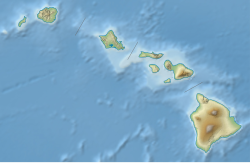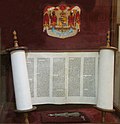| Temple Emanu-El | |
|---|---|
 Temple Emanu-El in 2016 | |
| Religion | |
| Affiliation | Reform Judaism |
| Ecclesiastical or organisational status | Synagogue |
| Leadership | Rabbi CJ Mays |
| Year consecrated | 1960 |
| Status | Active |
| Location | |
| Location | 2550 Pali Highway, Honolulu, Hawaii |
| Country | United States |
Location in Hawaii | |
| Geographic coordinates | 21°19′50″N157°50′40″W / 21.33056°N 157.84444°W |
| Architecture | |
| Architect(s) | Edward Sullam |
| Type | Synagogue |
| General contractor | T. Takahashi |
| Date established | 1938 (as a congregation) |
| Completed | 1960 |
| Website | |
| shaloha | |
Temple Emanu-El is a Reform Jewish congregation and synagogue, located at 2550 Pali Highway, in Honolulu, Hawaii, in the United States. Founded in 1938, the congregation joined the Union for Reform Judaism in 1952, and the synagogue building was consecrated in 1960 under the spiritual leadership of Rabbi Roy A. Rosenberg. The architect was Edward Sullam, and the builder was T. Takahashi. [1] The sanctuary is decorated with 12 8-foot (2.4 m) paintings by the New Mexico-based artist Alice Flitter. [2]

